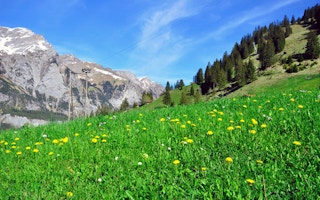Alpine ecosystems are on the rise. Between 2003 and 2010, plants have managed to scramble up another eight metres of mountain slope. On the way up, they were overtaken by butterflies, which collectively gained another 38 metres of higher ground. Alpine birds in turn fluttered an average of 42 metres higher.
Tobias Roth and colleagues from the University of Basel and the Petite Camargue Alsacienne research station at St Louis in France report in PLOS One, the journal of the Public Library of Science, that, at least in the short term, alpine landscapes offer safe habitats in a warming world.
“An average of eight metres difference in eight years and across all plant species is quite impressive for the often not very mobile plant communities”, said Valentin Amrhein, one of the authors.
“The results show that the biological impacts of climate change will not only become apparent in the long term. Animals and plants are already today adapting to the rising temperatures at a surprising pace.”
Parallel from the UK
British researchers have just confirmed that British butterflies have been moving north as average temperatures increase. But, as always with surveys of biodiversity, the picture is complicated by other factors.
Natural cycles of explosive growth and dramatic failure are regular features of bird and animal populations, driven by the numbers of predators and the availability of prey.
Habitats change, and so do farming practices, and these changes too affect species numbers. But average temperatures also affect farming practices and natural habitats. So the Swiss research was another attempt to try to disentangle some of the influences on local fauna and flora.
The researchers worked their way through data collected from 214 sample plots between 2003 and 2010, between altitudes of 500 and 3,000 metres, covering all the major ecosystems of the region.
Puzzles remain
Between 1995 and 2010, summer temperatures rose in Switzerland by about 0.07% each year at all altitudes. The researchers found no decrease in the variation of ecological communities in their temperature niches, which, they say, suggests that global warming has not led to more homogenous ecosystems.
At low altitudes, there was a shift towards warm-dwelling species for all three groups. The high altitude birds continued to move uphill, but plants and butterflies showed no significant changes above the tree line, for reasons that remain puzzling.
“It is possible that land-use related changes in habitats near the tree line outweigh the effects of climate warming. For example, many alpine pastures have been abandoned in recent years”, said Tobias Roth.
“It is also possible that alpine plants are better protected against changing climatic conditions, due to the highly varied surface of alpine landscapes.”

















